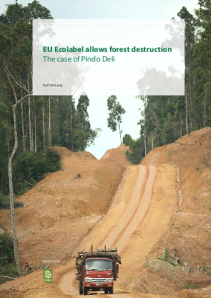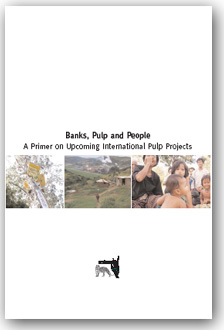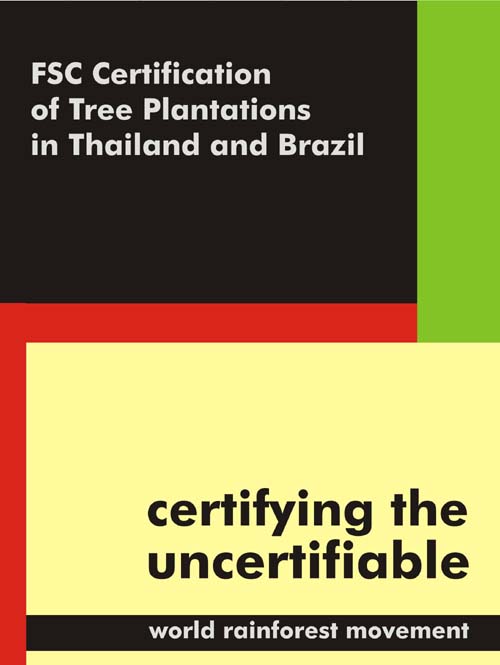Why SGS must withdraw its certificate of Mount Elgon.
By Chris Lang. Published in WRM Bulletin 131, June 2008.
In February 2008, the Uganda Wildlife Authority and the Uganda People’s Defense Forces evicted more than 4,000 people from the Benet and Ndorobo communities living in Mount Elgon National Park in East Uganda. People’s houses and crops were destroyed, cattle were confiscated and the people were left homeless. They found shelter where they could: in caves and under trees. The luckier ones stayed in a primary school or moved in with their relatives.[1]
The eviction of the Benet started ten days after Annick Van De Venster, a Belgian tourist, was shot and killed in Mount Elgon National Park. According to UWA, which is responsible for managing Uganda’s national parks, cattle thieves were responsible. UWA’s executive director, Moses Mapesa said, “We believe the people who shot at the tourist’s group mistook it to be a rival camp of cattle thieves.”[2]
UWA used the tragedy of a tourist’s death at Mount Elgon as an excuse to evict the Benet. “Following these incidents,” Moses Mapesa, UWA’s executive director, said, “UWA found it prudent to address the issue of encroachment in the park, which in any case is all illegal as the boundaries of the park were redefined in 2002.” Mapesa claimed that the eviction was “being undertaken humanely”.[3] He did not explain how evicting people from their homes and leaving them with nothing had anything to do with acting “humanely”.
In fact, the Benet have a legal right to live in Mount Elgon National Park. In October 2005, the Ugandan High Court in Mbale ruled that the Benet were the “historical and indigenous inhabitants” of parts of Mount Elgon National Park. The ruling stated that the Benet should be allowed to “carry out agricultural activities” in the areas to which they have historical claim.
But UWA’s Joshua Masereka, chief of Mount Elgon National Park, ignores the ruling. “We have always given the Benet time to vacate. We do not need them in the Park,” he said.
“Such disregard for power of courts is what is making access to justice for the poor and marginalized communities in Uganda unattainable,” says Chemisto Satya, a Programme Manager with ActionAid Uganda. ActionAid demanded that the government should provide immediate relief to the evicted people through its Disaster Preparedness Ministry.[4]
Mount Elgon National Park is certified as well managed under the Forest Stewardship Council system. Clearly, the fact that the national park is FSC certified has not helped the Benet Indigenous People.
SGS Qualifor, the certifying body which issued the FSC certificate for Mount Elgon, is aware of High Court ruling that the Benet are historical and indigenous inhabitants of Mount Elgon. “UWA has accepted the court ruling in the case of the Benet tribe and undertook not to act against them unless alternative land can be found (thus recognizing and respecting their rights)”, states SGS Qualifor’s 2007 Public Summary of the Certification Report.[5]
But when UWA evicted the Benet in February this year, they did not worry about finding any “alternative land”. In May, a group of about 100 people who had been evicted from Mount Elgon camped outside Parliament in Kampala, demanding that the government allocate them land.[6] A month later, Nelson Chelimo, the district chairman of Kapchorwa, near Mount Elgon, said that food aid was urgently need to save the lives of more than 1,000 Benet people. “People have no food and shelter following their eviction by Uganda Wildlife Authority and the army,” Chelimo said in a statement.[7]
In any case, FSC’s Principle 3, which relates to Indigenous Peoples, does not give forest managers the right to evict Indigenous Peoples if “alternative land can be found”, as SGS Qualifor suggests in its Public Summary. Principle 3 states that “The legal and customary rights of indigenous peoples to own, use and manage their lands, territories, and resources shall be recognized and respected.”[8] Therefore, UWA is only in compliance with Principle 3 if it recognises and respects the Benet’s rights to “own, use and manage their lands, territories, and resources”.
By evicting the Benet from Mount Elgon National Park, UWA has shown that it has no interest in complying either with FSC’s Principle 3 or the significantly weaker statement from SGS Qualifor that UWA would only evict the Benet if “alternative land can be found”. UWA booted the Benet out of the national park and left them without neither land nor homes.
Next month, SGS Qualifor is due to carry out an audit of Mount Elgon National Park.[9] This time SGS Qualifor has no choice other than to admit that the eviction of the Benet from Mount Elgon National Park is in breach of FSC’s Principle 3. For the simple reason that the management of the national park is not in compliance with FSC’s Principles on Indigenous Peoples, the certificate must be withdrawn.
References
[1] “Benet under massive eviction by wildlife authority”, ActionAid Uganda website.
[2] Herbert Ssempogo (2008) “Belgian tourist killed on Mt. Elgon“, New Vision, 6 February 2008.
Herbert Ssempogo (2008) “‘Cattle thieves killed tourist’”, New Vision, 7 February 2008.
[3] Gerald Tenywa (2008) “Guns recovered from park encroachers”, New Vision, 25 February 2008.
[4] “Benet under massive eviction by wildlife authority”, ActionAid Uganda website.
[5] “Forest Management Certification Report Section A: Public Summary. 9495-UG. UWA-FACE Mt Elgon National Park”, SGS Qualifor website.
[6] Madinah Tebajjukira (2008) “Mount Elgon encroachers at Parliament”, New Vision, 9 May 2008.
[7] Patrick Jaramogi (2008) “1,000 Benet face death over hunger”, New Vision, 3 June 2008.
[8] “FSC Principles and Criteria for Forest Stewardship FSC-STD-01-001 (version 4-0) EN”, Forest Stewardship Council. Approved 1993. Amended 1996, 1999, 2002.
[9] Email from Ivan Muir, Certification Manager at SGS, 18 June 2008: “The surveillance audits for MENP and KNP are scheduled for 7 – 14 July 2008”.










I think many people in the West fail to realize that many of the conservation efforts we are so proud of actually often end up displacing indigenous peoples. Coupled with legal injustices and actions by political parties, the indigenous peoples that live in and around these conservation areas really struggle. Thank you for providing information on what is going on in Uganda. Hopefully something positive will come out of SGS Qualifor’s upcoming inspection.
We are MOST AT RISK POPULATIONS’ SOCIETY IN UGANDA and have provided organisation development trainings to indigenous community leaders to enable them mobilise themselves for self determination in order to be cohesive and have hegemony when advocating for rights and a place in Uganda. We have also worked with them to promote good health seeking behaviour and stem the ravages of HIV. In the process we also came across indigenous Men-who-have-sex-with-men (Indigenous MSM). We want to do more with these communities and we realise we have to start with violence, abuse, discrimination and stigma (VADS) perceptions of leaders and other stakeholders. So, we are drawing plans to engage in anti-VADS campaigns. Support our cause please.
INDIGENOUS MEN-WHO-HAVE-SEX-WITH-MEN (MARPs) AMONG BENET AND NDOROBO OF MOUNTAIN ELGON, MBALE, UGANDA
The Human Rights and Human face of things
Keziah and Mukose (not real names) are light skinned, 22 and 24 year old, lean, transgendered male sex-workers and are mobilisers (under build better communities) from the Benet and Ndorobo indigenous tribes of Uganda. They were formerly in school but stopped because they could not afford fees. They trace their woes back to around January- February 2008, when the Uganda Wildlife Authority and the Uganda People’s Defense Forces evicted more than 4,000 people from the Benet and Ndorobo communities living in Mount Elgon National Park in East Uganda. People’s houses and crops were destroyed, cattle were confiscated and the people were left homeless. They have struggled to look for shelter, school fees and subsistence. MARPS IN UGANDA has worked with 72 Benets and 125 Ndorobo MSM (aged 18-42 years) since 2010. 27 Benet are 18-22 years; 22 Benet are 23-32 years; 23 Benet are 33+ years. 100 Ndorobo are 18-22 years; 25 are 23-32 years. In working with them the following have been their frequently demanded needs:
1. Enforcement of court ruling that re-instated the Benet as having a legal right to live in Mount Elgon National Park. In October 2005, the Ugandan High Court in Mbale ruled that the Benet were the “historical and indigenous inhabitants” of parts of Mount Elgon National Park. The ruling stated that the Benet should be allowed to “carry out agricultural activities” in the areas to which they have historical claim.
2. Providing scholarship for post secondary education. Because of lack of money, they engage in male sex-work and 23 were treated for STIs between January 2010-June 2011.
3. They shared cases of intimidation, gang-rape, exposure to unprotected receptive anal sexual intercourse.
4. They demanded for condoms and lubricant gels.
5. Need to belong to an empowering organisation to reach out to their communities.
WHAT MARPS IN UGANDA CAN DO ABOUT IT:
1. Seek funding to continue with generating reports about indigenous MSM in Uganda.
2. Provide support in form of a refuge transitory home.
3. Provide lubricants, condoms and an HIV awareness seminar.
4. Link the Benet and Ndorobo to poverty alleviation programmes through engaging them in participatory learning/planning sessions and eventually come up with a winning proposal which can then be used to solicit for funding.
5. Establish MARPS IN UGANDA as a lead organisation on MARPs issues and bring out the broader issues fuelling MARPs issues.
6. Provide a platform to address MARPs issues beyond HIV into HUMAN RIGHTS and DEVELOPMENT.